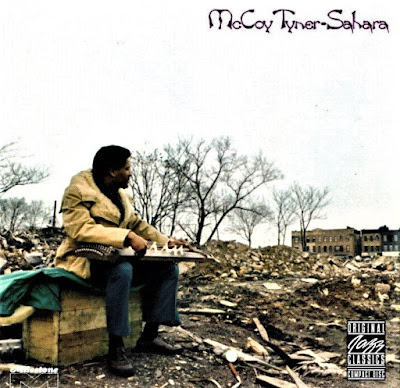It was very surprising to find that there was not yet a post on this blog focusing on an album by the prodigiously talented pianist McCoy Tyner, who died today at age 81. There have been several posts here on John Coltrane albums on which Tyner was a member of the so-called Classic Quartet with bassist Jimmy Garrison and drummer Elvin Jones, but nothing from Tyner's long and uniformly excellent solo career.
Tonight's post is a belated look at my favorite Tyner release, Sahara, released on Orrin Keepnews' Milestone Records in July 1972. Tyner had been releasing albums for almost a decade by that point, working for Impulse! and Blue Note, including some fine recordings, but Sahara was a supremely confident, wide-ranging, and thrilling recording.
"Ebony Queen" is powerful, propulsive and includes some stunning sax work by Sonny Fortune, who'd later join Miles Davis for the Dark Prince's mind-blowing mid-Seventies work, including the staggering live albums Agharta and Pangaea, both of which, someday, will be featured here, as well. Fortune blasts his way through his solo and sets the table for Tyner's stunning solo, filled with complex runs, signature left-hand block chords, and gripping intensity. This piece is a highlight of the leader's career.
"A Prayer for My Family" is a beautifully evocative, harmonically complex, and deeply introspective solo showcase for Tyner and shows his formidable gifts of speed, strength and dexterity in the ultimate of emotive expression on his instrument. "Valley of Life" shows the leader's penchant during the era for introducing new instrumentation to provide a dash of color to his palette of sounds, specifically utilizing the koto, the Japanese lute-like instrument. The use of the koto, however, is not a novelty, but a careful synthesis of sound, along with Fortune's fine flute playing and Alphonse Mouzon's percussion, to Tyner's compositional strengths.
After the two atmospheric pieces, "Rebirth" is a bracing return to power and precision with Mouzon providing a brief opening solo and bassist Calvin Hill keeping a very impressive rapid tempo as Tyner launches in to some of his fastest and most precise solo work in his lengthy career. The stamina of the trio of masters is pretty incredible to hear and, just before the three minute mark, Fortune leaps in and delivers another great performance with Tyner employing those heavy block chord vamps as accompaniment before the leader takes another short solo to wind things down.
Finally, there's the epic title track, clocking in at 23 1/2 minutes, but seeming not nearly as lengthy, due to its variations in tempo, intensity and instrumentation. There are echoes of Coltrane's classic Africa, with a variety of percussion from everyone but the horn player, a trumpeted elephant sound from Mouzon, and Tyner coming in with a sweeping introduction. Fortune doubles on the theme with the pianist before taking off with another superlative solo with Tyner again providing tremendous accompaniment before switching to flute while Fortune keeps going with his solo. At about thirteen minutes, there is a break with flute, percussion and a Hill solo. At about twenty minutes, the band returns to the main theme and brings this great piece and fantastic album to a close.
While Tyner delivers some of his very best soloing and Fortune also putting together some phenomenal work, credit has to also be given to Mouzon and Hill for giving top-notch support in keeping this stunning record on track. It is hard to imagine that any of the quartet did better work than on this epochal recording.
When I started going to a lot of jazz shows from 1990 to the later part of the decade, especially at the original Catalina Bar and Grill, one of the first performers I saw was Tyner, who I heard a few times during that era. One show, I sat right behind the pianist and was all but peering over his right shoulder. I was mesmerized by his prodigious technique and deeply emotive style.
One performance included Avery Sharpe on bass and Aaron Scott on drums and a testament to true leadership from Tyner was when Scott began a solo on a typically hard-charging tune. As Scott worked his way around his kit, it became readily apparent that he had entered a zone he'd rarely found himself in before. I remember a look in his eye and then looked over to see Tyner smiling and nodding, encouraging the drummer to see it through. The solo had to have been much longer than normal and Scott was so locked in that the audience began to clap, then offer shouts of encouragement, then yells of appreciation, and finally screaming and shouting as the drummer went into hyper-speed. When he finished, the room seemed to uniformly rise to its feet and burst into applause the likes of which I've never experienced in hundreds of concerts. Tyner's encouragement no doubt gave Scott the freedom to take his incredible solo as far as it could go.
I don't recall if it was that night, but Tyner and I were in the restroom washing our hands when I simply told him that it was an honor and privilege to hear him and his band play and his modesty as he thanked me was truly striking. I'll never forget those concerts and will always appreciate the amazing work this musical titan provided us over more than a half-century.
